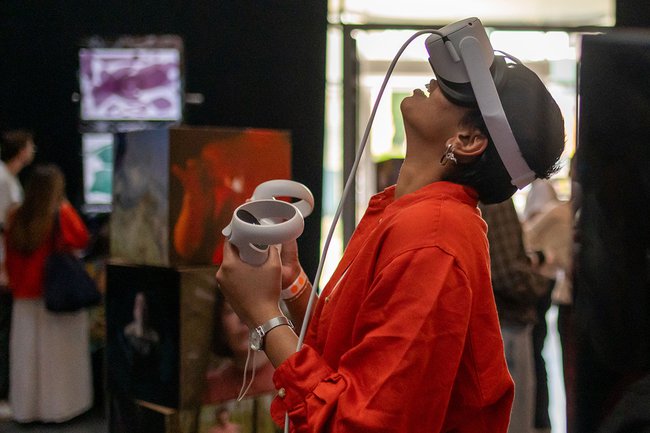Science Festival at the St. Pölten UAS
Researchers Invite Guests to Participate, Explore, and Be Amazed | 21 May 2025

On 21 May, the Campus St. Pölten opens its doors for all: The first E³UDRES² Science Festival gives visitors the chance to immerse themselves in the world of research. Workshops, interactive lab tours, and interactive stations provide opportunities for getting to know current research projects of the E³UDRES² partner institutions, talking to researchers, and learning more about the European University Alliance E³UDRES² and the St. Pölten University of Applied Sciences. The event is open for all and free of charge.
Awards for Researchers and Schools
Within the framework of the E³UDRES² Science Festivals, the winners of a school competition that took place prior to the festival are honoured as well. School classes from all over Austria were invited to take part in a photo challenge and to creatively work on the question “What should the older generation know about the climate crisis?” The most convincing submissions will receive awards at the festival.
In addition, outstanding scientific achievements of researchers, lecturers, and students of the E³UDRES² partner institutions will be honoured with the E³UDRES² Awards of Excellence. Prizes endowed with up to 1,000 EUR and access to international platforms of the E³UDRES² alliance await the most innovative projects.
Exhibitions on the EU and Students in the Ukraine War
The Science Festival features two exhibitions on the following topics:
- “30 years of Austria in the EU” in cooperation with Europe Direct Lower Austria
- “Unissued Diplomas”: a moving exhibition about students who were unable to complete their education due to the war in Ukraine, and about the importance of the access to education
“Pint of Science“ in the Inner City of St. Pölten
As part of the Science Festival, E³UDRES² brings the international science event “Pint of Science” to St. Pölten for the first time: On 19 and 20 May 2025, this event takes place worldwide and promises an entertaining evening with exciting presentations, cool drinks, and great company.
The “Pint of Science” programme in St. Pölten:
- 19 May, 19:00 | Chameleon Bar | “Mobilität mit Köpfchen: Sauber, Smart, Sozial” with Alexandra Anderluh, Researcher at the Carl Ritter von Ghega Institute for Integrated Mobility Research
- 20 May, 19:00 | Cinema Paradiso | “Teaching Robots to Talk (and Listen)” with Thomas Delissen, UAS Lecturer in the field of Data Intelligence
- 20 May, 19:00 | Chameleon Bar | “Frühlings-Detox statt CO²- Dauerrausch: Wie wir unsere Erde wieder nüchtern kriegen“ with Max Nutz, Climate and Energy Scientist at the Climate Change Center Austria
Participation in the “Pint of Science” talks requires a ticket. For tickets and more information, please go to St. Pölten | Pint of Science Austria.
Science Festivals in Three European Locations
The European University Alliance E³UDRES² turns 2025 into a year of science festivals: Apart from the one in St. Pölten, further Science Festivals will take place in two more European locations this year – in Enschede (Netherlands) and in Valmiera (Lithuania). In this way, the alliance wants to bring international scientists into the limelight and make research more tangible.
Another part of the E³UDRES² Science Festivals in St. Pölten is the NETTIES Conference of the International Association for eScience (IAFeS) which takes place on 19 and 20 May for an interested specialist audience.
A Week with a Focus on Science
Next to the E³UDRES² Science Festival, the Campus St. Pölten will also host diverse high-level workshops in May: Within the framework of a three-part workshop series, the participants will address questions of how to make research careers more attractive. The workshops are organised in collaboration with the Federal Ministry of Women, Science and Research and the European Commission.
About E³UDRES²
The European University Alliance E³UDRES² headed by the St. Pölten University of Applied Sciences is an alliance of nine higher education institutions and many further associated organisations throughout Europe. As E³UDRES², the involved institutions collectively promote the transformation of small and medium-sized towns and their rural surroundings into smart and sustainable European regions, develop new teaching and learning methods, and improve capacities for research and innovation.